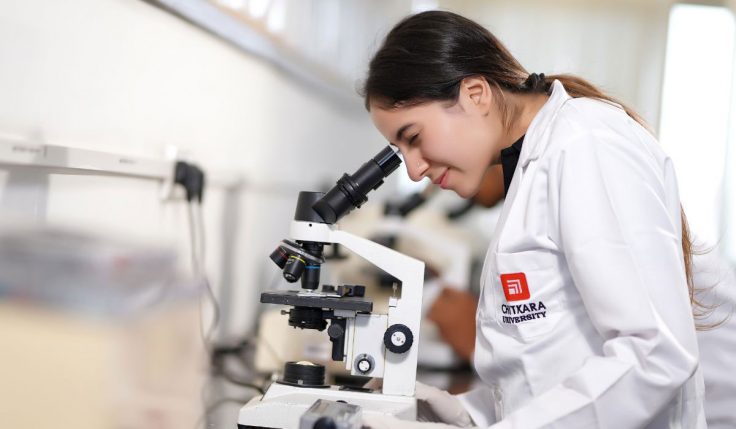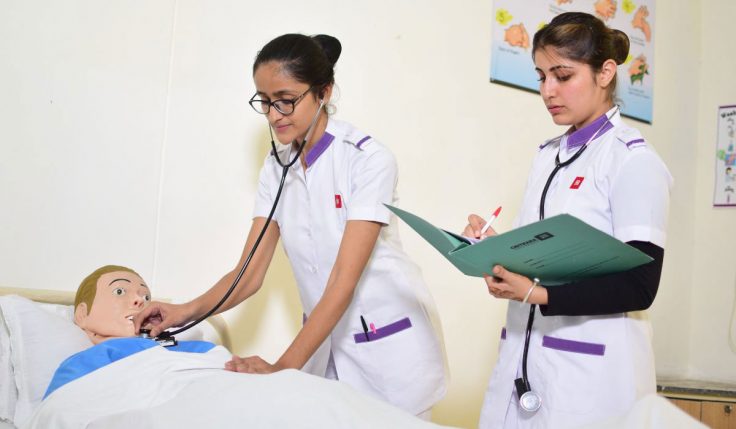A degree in health sciences can lead people toward a variety of job paths centered on health, wellness, and scientific research in today’s complex healthcare ecosystem. Having such a degree provides the opportunity for a wide range of options that cover several fields in healthcare. The Chitkara School of Health Sciences is one of the leading establishments for educating future healthcare professionals. It provides comprehensive programs and excellent education to educate students for the continually evolving healthcare industry.
Understanding the Depth of a Health Sciences Degree
An approach that is interdisciplinary is fundamental to a Health studies degree, since it incorporates different aspects of biological, behavioral, and health-related studies. It provides a wide curriculum that explores the intricacies of public health, epidemiology, pharmacology, anatomy, and physiology, among other subjects. This comprehensive approach gives students a strong foundation by combining scientific knowledge with useful skills necessary for success in the intricate field of healthcare.
Significance and Importance of Health Sciences Degrees
It is impossible to overestimate the importance of a health sciences degree in the current healthcare environment. The demand for qualified individuals who can navigate the complexity of healthcare systems, spur innovation, and solve a range of health concerns is growing as health and wellness become more and more of a worldwide priority. In addition to teaching academic information, a health sciences program places a strong emphasis on critical thinking, ethical issues, and practical skills—all of which are crucial components that develop effective healthcare practitioners and leaders.
Diving Deeper into the Vast Career Opportunities within Health Sciences
The allure of pursuing a Health Sciences degree extends far beyond its surface, unveiling a rich tapestry of career pathways that beckon graduates into diverse and impactful roles. Among these multifaceted trajectories are:
Clinical Practice:
Within the realm of clinical practice, graduates find themselves at the forefront of healthcare, assuming pivotal roles as physicians, nurses, physician assistants, therapists, or allied health professionals. These roles involve more than direct patient care; they encompass comprehensive healthcare delivery, from diagnosing complex ailments to administering treatments that significantly impact individuals’ health and overall well-being. The landscape of clinical practice is broad, encompassing various specialties and subspecialties. Physicians, for instance, may specialize in areas like paediatrics, cardiology, oncology, or surgery, while nurses might pursue roles in critical care, psychiatric nursing, or community health.
Health Administration and Management:
The domain of healthcare administration opens doors to graduates aspiring to manage healthcare facilities, engage in health policy formulation, delve into health informatics, or specialize in healthcare consulting. These roles are not merely administrative but crucial in ensuring the seamless operation of healthcare systems. Healthcare administrators are responsible for overseeing the day-to-day operations of hospitals, clinics, or healthcare organizations. They navigate complex regulatory frameworks, strategize for effective healthcare delivery, optimize resource allocation, and spearhead initiatives to enhance patient care quality and safety.
Public Health and Epidemiology:
Embracing a career in public health introduces individuals to a realm focused on disease prevention, health promotion, and community well-being. Graduates in this field work tirelessly to advocate for healthy lifestyles, conduct extensive research on population health trends, and craft and implement policies aimed at improving overall community health outcomes. Epidemiologists, as part of the public health sphere, play a crucial role in studying the patterns and determinants of diseases. Their work involves tracking diseases, identifying risk factors, and designing interventions for disease control and prevention, crucial in mitigating public health crises.
Research and Academia:
For individuals with a passion for scientific inquiry, the avenue of research and academia within Health Sciences offers a realm of boundless exploration and innovation. Opportunities exist in research settings, academic institutions, or pharmaceutical companies, allowing individuals to delve into diverse scientific inquiries and contribute significantly to advancements in medical technology, drug development, and innovative treatments. Engaging in research pursuits allows individuals to explore groundbreaking discoveries, conduct clinical trials, analyze healthcare data, and publish scholarly work that contributes to shaping the future of healthcare practices and policies.
The Chitkara School of Health Sciences, established in 2011 to bridge the gap in the healthcare sector, offers an extensive array of industry-aligned programs ensuring graduates are both academically prepared and industry-ready. The curriculum spans a diverse spectrum of healthcare fields:
- Nursing (B.Sc / Post Basic / M.Sc): Equipping students with comprehensive nursing skills across various specializations.
- Physiotherapy (Bachelors): Providing a strong foundation in physical therapy techniques and patient care.
- Optometry (Bachelors / Masters): Covering optometric practices and advanced studies in vision science.
- B.Sc (Hons.) Nutrition & Dietetics: Focusing on nutrition science, dietary planning, and health management.
- Medical Laboratory Science (Bachelors): Training students in laboratory procedures and diagnostic techniques.
- MRI (Bachelors): Delving into the principles and applications of magnetic resonance imaging technology.
- Operation Theatre Tech (Bachelors): Preparing individuals for roles in surgical procedures and operation theatre management.
- Clinical Embryology (M.Sc) (Masters): Offering advanced studies in embryology and reproductive sciences.
These programs emphasize practical experience and industry relevance. Graduates are highly sought after by prestigious organizations such as Apollo Hospital and the World Health Organization, emphasizing the institution’s commitment to producing skilled and employable healthcare professionals. The school’s dedication to research, academic excellence, and industry connections ensures graduates are prepared to meet the dynamic challenges of the healthcare sector while making a significant impact on the community through their education and expertise.






